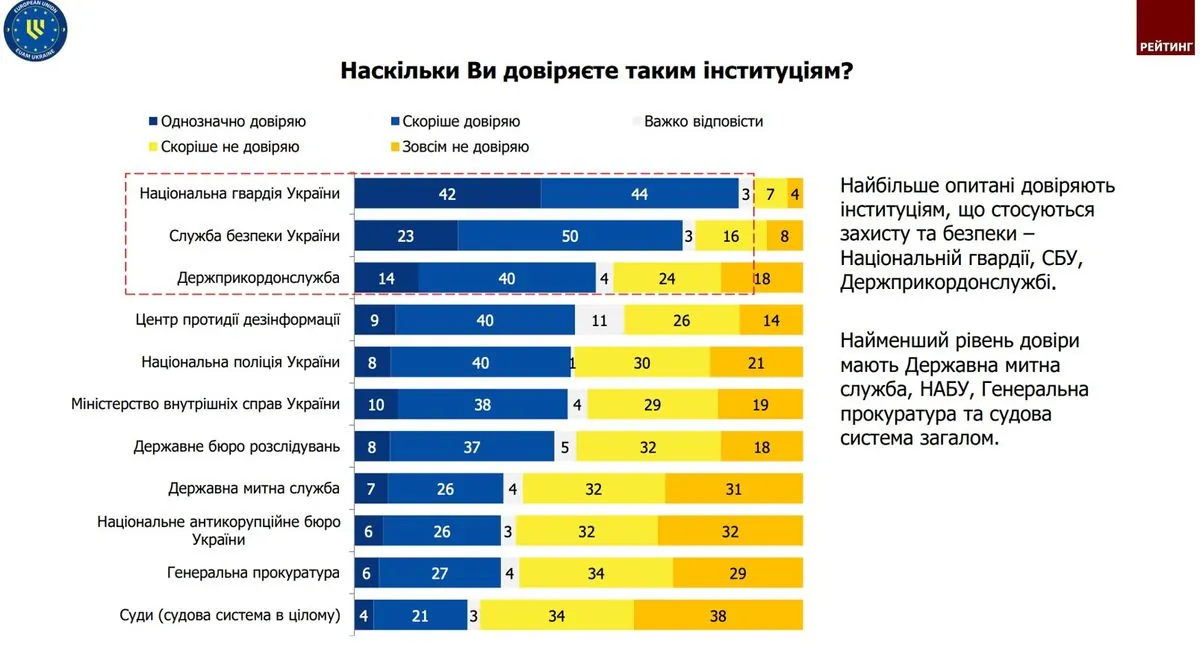Poll reveals crisis of trust in NABU and customs: will the anti-corruption bureau be reformed?
Kyiv • UNN
The poll showed that only 33% of Ukrainians trust NABU and customs, while more than 60% express distrust. Despite the same indicators, the customs is scheduled to be relaunched, while the NABU continues to work unchanged.

The National Anti-Corruption Bureau of Ukraine (NABU) is trusted by the same number of Ukrainians as the State Customs Service - only 33%. At the same time, more than 60% of citizens do not trust them. This is according to a survey conducted by the sociological group “Rating”.
Details
The results of the survey showed an alarming situation with trust in key state institutions designed to ensure transparency and compliance with the law. According to the survey, the level of trust in the National Anti-Corruption Bureau and the State Customs Service is approximately 33%. However, more than 60% of citizens express distrust of these agencies, which raises serious questions about their work.

Low efficiency and distrust of the customs service has already led to plans for its complete restart.
At the same time, the NABU, which has the same share of support from citizens, is currently undergoing only an audit, and there is no question of restarting it.
This raises the question of a fair approach to both bodies: if the problems of the Customs Service are sufficient grounds for its renewal, why does the NABU continue to work without changes? After all, the crisis in NABU is not only related to low trust in the agency and inefficiency of its activities - recent internal scandals also demonstrate the political bias of anti-corruption activists, as recently dismissed First Deputy Director Gizo Uglava publicly stated .
Oleh Shram, a lawyer and former advisor to the Director of the State Bureau of Investigation, asked the same question.
Last year, a sociological study was conducted at the request of our Western partners, and the level of trust in NABU was between the BES and the Customs Service. Since then, we have seen a reboot of the BES and customs, and the situation with NABU has remained the same. This survey repeats the same story - customs is not trusted and everyone says it is bad, while NABU is good at the same level
In his opinion, such a “loyal” attitude to the NABU can only be explained by the fact that the bureau performs some other tasks rather than fighting corruption.
Add
Recently, the public has accumulated many questions about the work of NABU detectives. In particular, there are often statements about the loss of independence of anti-corruption bodies in Ukraine. This was, among other things, stated by the legal community. They pointed out that the real goal of anti-corruption activists has changed from fighting corruption to putting pressure on certain public officials to achieve “external” goals.
In addition, the lawyers' community is sounding the alarm over NABU Director Semen Kryvonos' idea to create his own forensic expertise at the bureau, because “their” experts in the investigation have nothing to do with an independent investigation.
Manipulation of examinations is a common practice for NABU, but it often plays against the detectives themselves. For example, as was the case with the examinations in the cases of Rotterdam+ and former Infrastructure Minister Volodymyr Omelyan. According to lawyer Iryna Odynets, NABU lost in court because during the investigation, detectives in these cases “drew” forensic examinations in friendly private offices, and then unsuccessfully tried to confirm their accusations with them. Volodymyr Omelyan himself also noted that detectives engaged “dubious experts” during the investigation of the case against him.
In addition, the NABU tried to leak the expert examination in the case against former Minister of Agrarian Policy Mykola Solsky, which they themselves had ordered and which was apparently supposed to testify to his innocence.